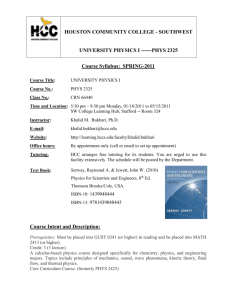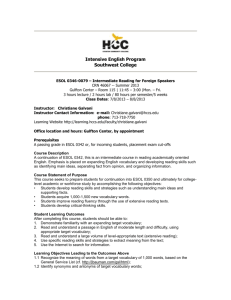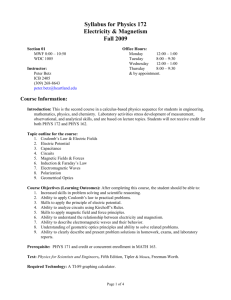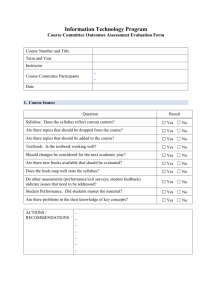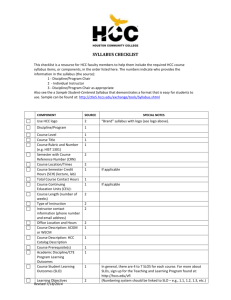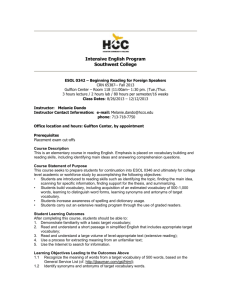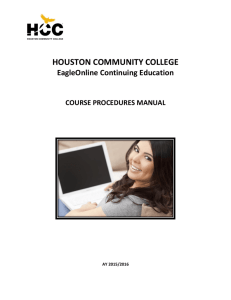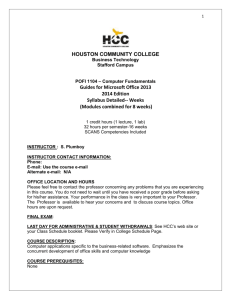I ------PHYS 2125 Course Syllabus: SPRING-2011
advertisement
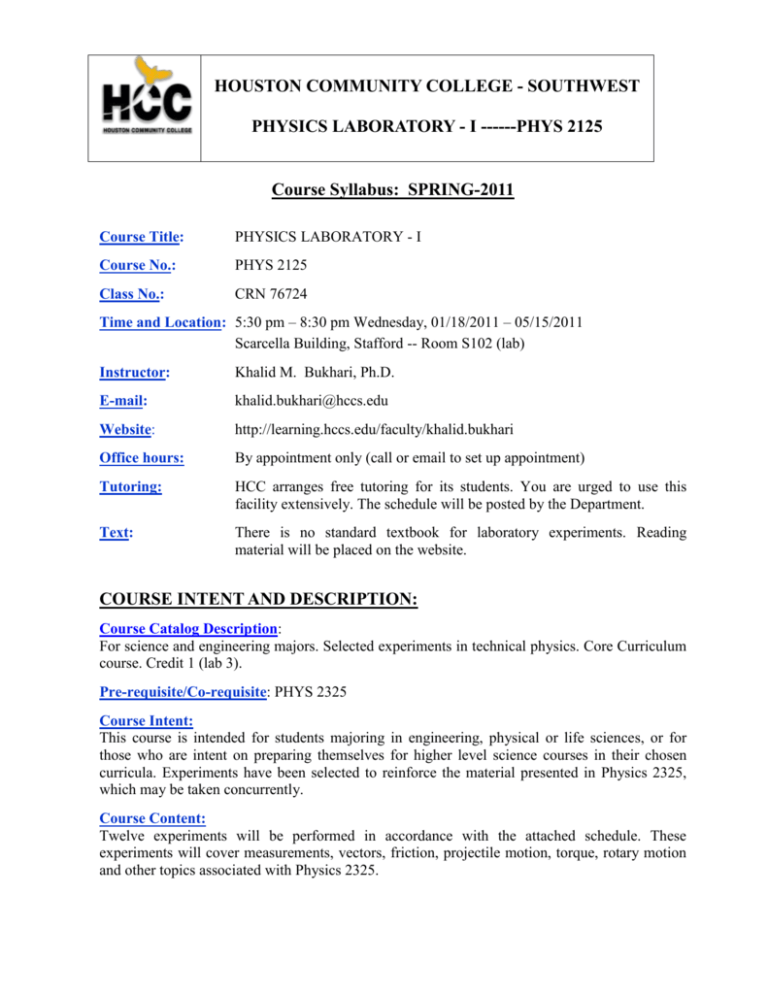
HOUSTON COMMUNITY COLLEGE - SOUTHWEST PHYSICS LABORATORY - I ------PHYS 2125 Course Syllabus: SPRING-2011 Course Title: PHYSICS LABORATORY - I Course No.: PHYS 2125 Class No.: CRN 76724 Time and Location: 5:30 pm – 8:30 pm Wednesday, 01/18/2011 – 05/15/2011 Scarcella Building, Stafford -- Room S102 (lab) Instructor: Khalid M. Bukhari, Ph.D. E-mail: khalid.bukhari@hccs.edu Website: http://learning.hccs.edu/faculty/khalid.bukhari Office hours: By appointment only (call or email to set up appointment) Tutoring: HCC arranges free tutoring for its students. You are urged to use this facility extensively. The schedule will be posted by the Department. Text: There is no standard textbook for laboratory experiments. Reading material will be placed on the website. COURSE INTENT AND DESCRIPTION: Course Catalog Description: For science and engineering majors. Selected experiments in technical physics. Core Curriculum course. Credit 1 (lab 3). Pre-requisite/Co-requisite: PHYS 2325 Course Intent: This course is intended for students majoring in engineering, physical or life sciences, or for those who are intent on preparing themselves for higher level science courses in their chosen curricula. Experiments have been selected to reinforce the material presented in Physics 2325, which may be taken concurrently. Course Content: Twelve experiments will be performed in accordance with the attached schedule. These experiments will cover measurements, vectors, friction, projectile motion, torque, rotary motion and other topics associated with Physics 2325. HCC-Southwest PHYS 2125 Student Learning Outcomes 1. Design and perform experiments, collect and analyze data, and interpret results obtained in a laboratory setting. 2. Analyze, evaluate, and test a model or scientific hypothesis by comparing with experimental data. 3. Use scientific language to demonstrate an understanding of the difference between scientific and non-scientific interpretations of phenomena observed Learning Objectives 1.1 Identify appropriate sources of information for conducting laboratory experiments. 1.2 Design and/or conduct basic experiments involving principles of classical mechanics. 1.3 Demonstrate competency in the use of laboratory instrumentation, including computer tools for data collection. 2.1 Relate physical observations and measurements involving classical mechanics to theoretical principles. 2.2 Evaluate the accuracy of physical measurements and the potential sources of error in the measurements. 3.1 Prepare laboratory reports that clearly communicate experimental information in a logical and scientific manner. INSTRUCTOR GUIDELINES AND POLICIES Attendance: HCCS Attendance Policy is stated in the Students Handbook as follows: “You are expected to attend all lecture classes and labs regularly. You are also responsible for materials covered during your absences. Instructors may be willing to consult with you for make-up assignments, but it is your responsibility to contact the instructor. Class attendance is checked daily. Although it is your responsibility to drop a course for nonattendance, the instructor has the authority to drop you for excessive absences. You may be dropped from a course after accumulating absences in excess of 12.5 percent of the total hours of instruction (lecture and lab)” You are expected to attend all laboratory sessions. There is no make up for missed labs even if you have legitimate reason for being absent. Therefore, please make every effort to attend all the sessions. Lab reports and Post Lab questions will be accepted only for labs actually attended. For this course, absences will be limited to two class-periods. If circumstances significantly prevent you from attending classes, please inform the instructor. Tardiness (Arriving late to class): It is strongly recommended that you come to the lab on time. You will miss important information when you are late. It is extremely difficult to follow a lesson when you catch it midway, not knowing how it began. You will be marked tardy on your class attendance if you come late. On exam day no extra time is given if you arrive late. Course Syllabus 2 Spring 2011 HCC-Southwest PHYS 2125 Assignments: For each experiment, a write-up will be available on the learning web. You are expected to read it carefully before coming to class. With each lab manual there is a post-lab question sheet. Solution to Post Lab. questions are due with the Lab report is in following lab period. Short Quizzes: A short quiz of five to ten minutes duration will be held at the start of class regarding the experiment to be performed that day. They will be graded and the marks will add up towards the final grade in the course. Missed quizzes will count as zero marks. Support Course Material: Course material including syllabus, lab manuals, notices, links to useful material etc. will be posted on the LEARNING WEB. You should see the site often. To use the LEARNING WEB, you can use the link mentioned on page 1, or go to http://learning.hccs.edu, type ‘bukhari’ in ‘find a faculty member’, and click ‘search’. Then click ‘spring 2011 - physics lab 1’. Other Information: Free physics tutoring is available. A tutoring schedule will be posted in the classroom and lab, and can also be seen on the departmental web site (www.hccs.edu then click ‘find a tutor’ and then click ‘find a tutor near you’, in college enter ‘southwest’, and in subject enter ‘physics’, then click ‘search’. This will show you the timings and locations of the tutors. Grade Determination: The quizzes, solutions to post-lab questions, as well as the Lab reports will be graded and their marks will count towards the final grade. Each experiment will be graded on 100 point basis. Generally, the quiz and post Lab questions will have 15 points each, while the Lab report will be of 70 points. A comprehensive final exam will be conducted during the last class period. The final grade is based on the score out of 100% as follows: Lab reports (including report, quiz and post- lab questions) 70 % Final Exam 30 % Total 100 % Grading Scale: Marks range Letter grade 0 - 59 F 60 - 69 D 70 - 79 C 80 - 89 B 90 - 100 A LABORATORY EXPERIMENTS AND LAB REPORTS: Laboratory Policy: The instructor will review general laboratory rules and safety instructions. Except for the uniform circular motion experiment, the experiments themselves are non-hazardous. This one experiment will require the use of goggles. Experiments will be performed in-groups of 3 to 5 students. Each Lab-Report and Post-Lab questions are due at the start of the next class period. Course Syllabus 3 Spring 2011 HCC-Southwest PHYS 2125 Come on time and be prepared. Read the experiment before coming to class. If you follow this practice, you will be much better organized when doing the experiments and your lab experience will be much more rewarding. Examination: A test will be given on the final class period. The test will have problems similar to those contained in the quizzes and post lab questions. General Procedures: At the beginning of the class will be a short quiz regarding the experiment to be done. Then the Instructor will brief the students on the day’s experiment. The students will then collect the equipment, perform the experiment, and return the equipment. Each student should get the instructor’s signature on his/her data sheet. The Instructor will then explain the procedure for the experiment to be performed the following week. Please return all laboratory equipment used during the experiments to their original location after you are done, unless otherwise instructed. Leave your area clean and organized. Take all necessary safety precautions and observe all safety rules. Don’t hesitate to ask for advice from the instructor if you are unsure how to safely operate a piece of equipment. Inform the instructor of any damaged, worn, unusable, or possibly dangerous equipment. Each student should complete his/her own data sheet to attach to the report. Lab report format: Each Lab. report should be typed (except for the data sheet and calculations), and should include: 1. A title page On this page include your name; course name and number; the number, title and date of the experiment; your lab group number. 2. The instruction pages These are the pages describing 2.1 The Purpose / Objectives of the experiment 2.2 The list of Apparatus / Equipments used in the experiment 2.3 The Theory and equations used. 2.4 Summary of the procedures followed 3. Data and observations Record all your measurements carefully in a tabular form. Use data sheets from the manuals. 4. Data Analysis / Calculations. Carry out all the calculations using your data showing your steps clearly. Draw graphs / diagrams whenever required and explain what they means. For instance if you have got a straight line graph, determine its slope and relate the slope to the physical problem at hand. 5. Conclusion This includes a Summary, Conclusion and Discussion of the results. This usually requires you to state how good your results are in comparison with the objectives you stated at the beginning of your report. Compare your results with accepted values and calculate the percentage error. Discuss the sources of these errors and give other comments you would like to make about the experiment. Discuss areas of improvement in procedure to reduce errors. (This is the most important part of the lab report, and has the highest marks reserved for it) Course Syllabus 4 Spring 2011 HCC-Southwest PHYS 2125 Important Dates: January 14 Thursday January 17 Monday January 18 Tuesday January 18- February 3 January 19 Wednesday January 19 Wednesday January 31 Monday February 4- 9 February 21 Monday March 14-20 Mon- Sun April 14 Thursday April 22-24 Fri- Sun May 8 Sunday May 9-15 Mon- Sun May 20 Friday Last Day for 100 % Refund Offices Closed- Martin Luther King, Jr. Observance Classes Begin- Drop/Add/Swap Fee ($15.00) Begins 70% Refund Registration Ends Last Day for Drop/Add/Swap Official Date of Record 25% Refund Office Closed- Presidents Day Holiday Office Closed- Spring Break Last Day for Administrative/ Student Withdrawals- 4:30pm Office Closed- Easter Holiday Instruction Ends Final Examinations Grades Available to Students Tentative List for PHYS 2125 Experiments: Note: a) At least 12 experiments will be done from the following list b) The dates of the experiments will be announced in class. c) This outline is subject to change as the semester progresses Experiment Number Course Syllabus Title 1 Error and Data Analysis 2 Measurement and Accuracy 3 Vector Addition 4 Acceleration due to Gravity 5 Coefficient of Friction 6 Uniform Circular Motion 7 Work and Energy 8 The Ballistic Pendulum 9 Simple Machine 10 Equilibrium of a Rigid Body 11 Conservation of Angular Momentum 12 Rotational Inertia 13 Archimedes Principle 5 Spring 2011 HCC-Southwest PHYS 2125 Withdrawal Policy: It is the responsibility of the student to officially drop or withdraw from a course. Failure to officially withdraw may result in the student receiving an "F" in the course. A student who officially withdraws from a course before the Official Date of Record will not receive a grade and the course will not appear on the student's permanent record. A student withdrawing from a course after this period and prior to the deadline designated in the HCC calendar will receive a grade of "W". Students should take care in dropping a course, as the third or future attempt to retake a course will result in a higher rate of tuition. If you stop attending class and do not officially withdraw, you will receive an “F” for the course. Students may only drop online during the drop/add period listed in the registration calendar. After the first week of class in a regular term, students must complete a withdrawal form and meet with a counselor to complete the withdrawal process. Please refer to Academic Policies. Course Withdrawals - First Time Freshman Students - Fall 2007 and Later: Under Section 51.907 of the Texas Education Code "an institution of higher education may not permit a student to drop more than six courses, including any course a transfer student has dropped at another institution of higher education." This statute was enacted by the State of Texas in Spring 2007 and applies to students who enroll in a public institution of higher education as a first - time freshman in fall 2007 or later. Any course that a student drops is counted toward the six - course limit if "(1) the student was able to drop the course without receiving a grade or incurring an academic penalty; (2) the student's transcript indicates or will indicate that the student was enrolled in the course; and (3) the student is not dropping the course in order to withdraw from the institution." Policies and procedures for implementation of this statute are being developed and will be published as soon as they are available. HCC students affected by this statute that have attended or plan to attend another institution of higher education should become familiar with that institution's policies on dropping courses. NOTICE: Students who repeat a course three or more times may soon face significant tuition/fee increases at HCC and other Texas public colleges and universities. If you are considering course withdrawal because you are not earning passing grades, confer with your instructor/counselor as early as possible about your study habits, reading and writing homework, test-taking skills, attendance, course participation, and opportunities for tutoring or other assistance that might be available. Disability Support Services (DSS): Any student with a documented disability (e.g. physical, learning, psychiatric, vision, hearing, etc.) who needs to arrange reasonable accommodations must contact the Disability Services Office at the college at the beginning of each semester. Faculties are authorized to provide only the accommodations requested by the Disability Support Services Office. If you have any special needs or disabilities which may affect your ability to succeed in college classes or participate in college programs/activities, please contact SW College ADA Counselor at 713-718-7909 or ADA System coordinator at (713) 718-5165. Academic Dishonesty: Students are responsible for conducting themselves with honor and integrity in fulfilling course requirements. Penalties and/or disciplinary proceedings may be initiated by College System officials Course Syllabus 6 Spring 2011 HCC-Southwest PHYS 2125 against a student accused of scholastic dishonesty. “Scholastic dishonesty” includes, but is not limited to, cheating on a test, plagiarism, and collusion. Possible punishments may include a grade of "0" on the particular assignment, failure in the course, and/or recommendation for probation or dismissal from the college system HCCS Sexual Harassment Policy: HCC shall provide an educational, employment, and business environment free of sexual harassment. Sexual harassment is a form of sex discrimination that is not tolerated at HCC. Any student who feels that he or she is the victim of sexual harassment has the right to seek redress of the grievance. HCC provides procedures for reviewing and resolving such complaints through its Grievance Policy. Substantiated accusations may result in disciplinary action against the offender, up to and including termination of the employee or suspension of the student. In addition, complainants who make accusations of sexual harassment in bad faith may be subject to equivalent disciplinary action. For these and other policies please refer to your student handbook. Also visit the ADA web site at: http://www.hccs.edu/students/disability/index.htm. Faculty Handbook / Faculty Orientation is also available at http://www.hccs.edu/students/disability/faculty.htm Cell phones and beepers: All cell phones and pagers should be set on “silent” or “vibrate” during class times. Recording: Absolutely no recording of any sort unless otherwise recommended by ADA office. GENERAL SUGGESTIONS FOR LEARNING PHYSICS: Physics, the most fundamental physical science, is concerned with the basic principles of the Universe. It is the foundation on which the other physical sciences - astronomy, chemistry, and geology - are based. The beauty of physics lies in the simplicity of its fundamental theories and in the manner in which a small number of basic concepts, equations, and assumptions can alter and expand our view of the world. In this course we will be covering the topics of classical mechanics and the properties of fluids. As you might suspect, it can be easy to fall behind and not get your reports in on time. Following are some general tips, which may be helpful: * Learning physics takes time! A reasonable guide is to allow you a minimum of three hours of study time for the preparation of each lab report. Heavy work and/or class loads are not compatible with learning physics. * Attend class regularly! Take generous notes during class. Ask questions. * Read each of the assigned experiments before you come to Class. This will make the labs more meaningful for you. * Good math skills are a must! To be successful you must be comfortable with trigonometry, exponentials, logarithms, differentials, and integration. * You must have a good scientific calculator with the necessary trigonometric, logarithmic, and exponential functions. Know how to use it and have it with you at all class periods. You will be expected to use it during the execution of the experiments. * Go to the school sponsored tutoring sessions if you are having trouble keeping up. Remember that nobody can teach you physics, the night before the exam. Course Syllabus 7 Spring 2011
